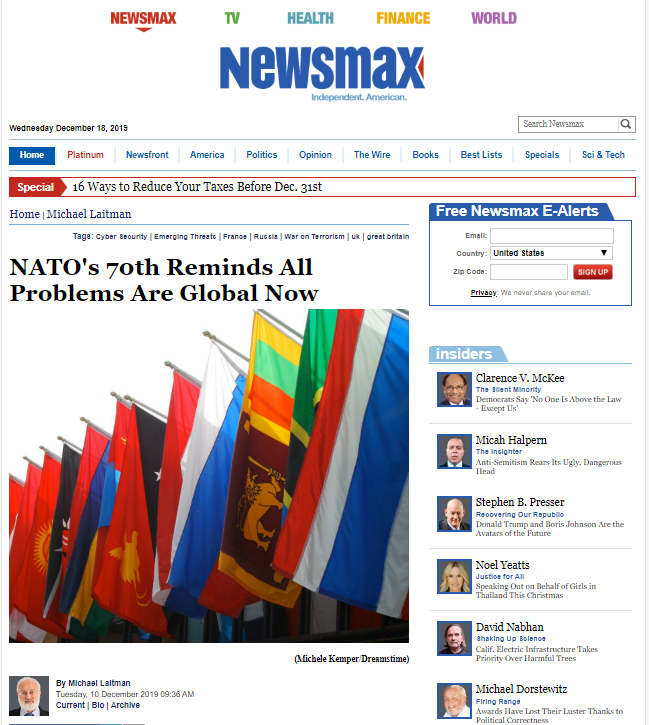
A new year is about to begin, and a guarantee of global security is not appearing on the horizon. On the contrary, the world is facing an unprecedented amalgamation of challenges on cybersecurity, wars, massive migrations, and rising nuclear and military powers.
A flamboyant 70th anniversary of NATO recently celebrated in the UK intended to show unity among the almost 30 nation members to deal with the most pressing global security problems, but as an ailing septuagenarian whose health and balance is dubious, the Western military alliance showed more fractures than cohesion.
Should We Lose Hope in the Vision of a Safer World?
We cannot lose hope.
It’s the planet we live on, and any crisis and threat will eventually affect us one way or another. Thus, we cannot simply ignore what is ahead of us.
However, we cannot expect meaningful changes from international organizations that have proven themselves to have a limited capacity, or lack of commitment to act toward a comprehensive solution.
The true solution to peace and stability is not in organizations.
It’s in people, i.e., in changing our human nature — from self-concern to mutual concern, self-benefit to benefiting others, and self-aimed reception to positively connecting with others.
In such a way, we can envision a harmonious and safe future for humanity as a whole.
The World Is Not a Playground
Instead of a common ground, the current international arena resembles a battlefield.
The tense environment in the last NATO summit showed a clash of personalities and incendiary reactions from world leaders playing honor games as small children throwing tantrums. However, no solutions to global threats will come from acting like toddlers on a playground.
A more serious, in-depth approach is required.
In the summit’s final statement, the countries represented in the alliance, including the U.S., Canada, France, and Great Britain, among others, pledged to take “stronger action” to combat terrorism globally and concurred on what they called “challenges” posed by China and Russia. But when it came to the question of money, the ongoing discussion of who pays the bills to keep afloat NATO’s operations remained inconclusive.
Its annual budget is $1.84 billion, according to official figures. Just over 22% of the total is paid by the US, the main contributor. Only 7 out of the 29 members are meeting their spending obligations, a reason for sharp and unsolved disagreement between the American administration and other allies. With the funding still in question, the meeting was rich in photo opportunities and poor in practical conclusions.
Positive Human Connection Is the Only Worthwhile Investment
Billions can be spent on defense globally, but it will be wasted until we tackle our real problem: our self-centered, egoistic attitude toward everyone and everything around us.
Humankind has evolved into a globally interdependent and interconnected human network.
The new reality of an increasingly intricate global system clashes with our past and present egoism, causing tension and conflicts at a larger and more complex scale.
Today’s multifaceted crisis indicates that we need an inclusive and holistic approach to solving our myriad problems. In an interconnected world, there are no local problems.
The need for solutions that favor humanity will call for consistent deliberation among representatives of all countries as equals. We will increasingly see how it’s impossible for any country to overcome a crisis on its own, and that instead of advancing personal or local interests, every problem should be addressed as a global problem.
Treating Every Problem as a Global Problem
By addressing global issues in the spirit of our connection, will we find the right way to face our many problems. Ahead of us is the most important choice humanity has ever faced: Do we adapt to the conditions evolution has placed before us proactively, by increasing our understanding and awareness, or will we be forced to adapt by blows and suffering?
There is no need for humanity to reinvent the wheel in order to find peace and harmony. We can use an example from nature, which acts according to integral laws.
All problems and differences emerge between us in order for us to seek their complementarity and balance by finding our common point of connection upon them: the intention to benefit the whole system of humanity and nature that we live in.
From Egoistic Competition to Positive Integral Connection
Global challenges and threats present opportunities to change our current direction, based on egoistic attitudes and interests, which is leading to a dead end. We need to realize that the only way out of this sinking ship is to connect into a single organism upon our differences.
As the human body contains a diverse array of cells and organs performing different duties in mutual complementarity to sustain its health and functionality, so we as a common body of humanity need to also develop such an overriding attitude to benefit the whole system that we are parts of.
In the past, we progressed by means of egoistic competition. However, we have now entered a period of development where nature is increasingly showing how it treats us as a single organism.
We can thus no longer enjoy our lives by trying to struggle with one another, each on the account of others. Doing so only leads to more problems, and ultimately, more suffering.
On the contrary, the way we can progress to greater happiness, confidence, and harmony is by positively connecting to each other.
The fundamental principle of living harmoniously in our era is to relate to humanity as a single organism. The reason that our inborn egoistic nature does not let us see the interdependent and interconnected reality is in order that we voluntarily apply ourselves to positively connect above all our egoistic differences, and by doing so, realize a peaceful world filled with joy.
Featured in Newsmax